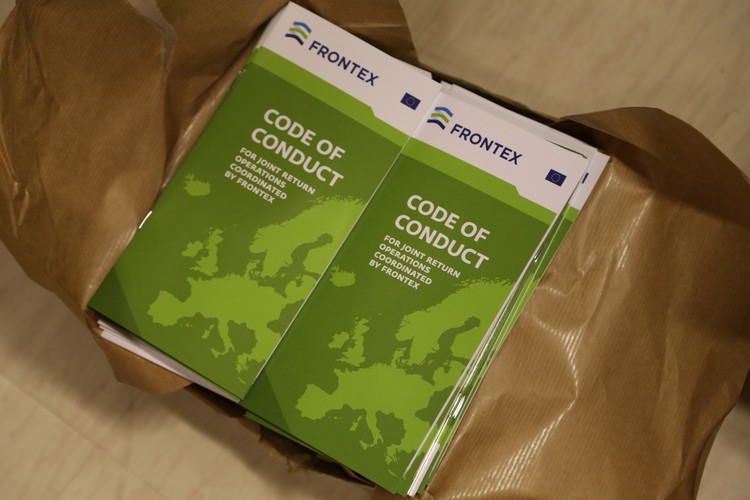Frontex has published a Code of Conduct for Joint Return Operations. The document, created in line with the Frontex Regulation, sets out common principles and procedures for joint return operations coordinated by Frontex.
The process of returning people on joint return flights is governed by strict procedures to ensure full respect for fundamental rights and the safety of returnees and other participants. The rules and best practices for return flights are now gathered in a single Code of Conduct.
The main aim of the Code is to ensure that all joint return operations are conducted as humanely as possible. A full chapter is dedicated to human rights monitoring. This function is carried out on most flights by observers from international organisations, NGOs or national authorities. The Code specifies that the monitors must have access to all relevant information, including travel documents of returnees and information about any special conditions, including pregnancy or illness. The Code also clearly specifies that medical personnel are required on every flight and if the escorting officers are not able to communicate with the returnees there should be interpreters on board. The Code stresses that the use of force should be avoided or limited to the minimum and emphasizes the importance of cooperation with returnees. All participants in Frontex joint operations are also obliged to report any incidents they believe violate the Code of Conduct during a return flight.
The Code of Conduct was created in consultation with EU Member States and Frontex Consultative Forum. It is based on guidelines for joint returns created by Frontex in 2009, which contain detailed instructions for the practical implementation of joint returns. Best Practices for the removal of illegally present third-country nationals by air is notable not just for its level of detail, but for the attention it pays to safeguarding the rights of returnees. The document contains advice on everything from seating plans to dress codes, luggage allowances, and even what food should served on the plane to respect the dietary requirements of different religions.
Third country nationals who have exhausted all legal possibilities of staying in the EU, such as persons who have overstayed their visa or failed the asylum procedure, are subject to a return decision issued by a member state. In 2012 over 159 000 third country nationals were returned from the EU to their countries of origin. More than 2 000 of those were returned in joint return operations coordinated by Frontex.
Joint return operations are organised when third country nationals are returned from several member states using one charter flight. In joint operations one of the member states charters a plane to take returnees back to their country of origin. When there are empty seats on the plane, the organising Member State contacts Frontex, which then offers those seats to the authorities of other member states, who can use the same charter flight for their returnees. People returned in joint operations are all subject to individual return decisions from member states.
